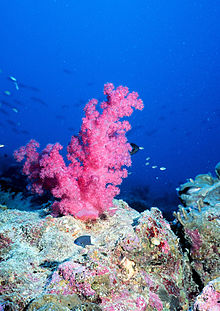This ocean oddity has a beauty all its own.
I found some pics & information & wanted to publish it here.
I learned a lot about sea coral!

Corals are marine organisms living in compact colonies of many identical individual "polyps". The group includes the important reef builders that inhabit tropical oceans, which secrete calcium carbonate to form a hard skeleton.
Although corals can catch small fish and animals such as plankton using stinging cells on their tentacles, most corals obtain most of their energy and nutrients from photosynthetic unicellular algae. Such corals require sunlight and grow in clear, shallow water, typically at depths shallower than 200 ft.
Corals can be major contributors to the physical structure of the coral reefs that develop in tropical and subtropical waters, such as the enormous Great Barrier Reef off the coast of Queensland, Australia. Other corals do not have associated algae and can live in much deeper water.
Threats -
Corals are highly sensitive to environmental changes. Scientists have predicted that over 50% of the world's coral reefs may be destroyed by 2030; as a result most nations protect them through environmental laws.
Seaweed/Algae can destroy a coral reef. In the Caribbean and tropical Pacific, direct contact between ~40 to 70% of common seaweeds and coral cause bleaching and death to the coral. Seaweed and algae proliferate given adequate nutrients and limited grazing by herbivores.
Coral die if surrounding water temperature changes by more than a degree or two beyond their normal range or if water salinity drops. In an early symptom of environmental stress, corals expel their symbiotic algae & without it coral tissues become colorless as they reveal the white of their calcium carbonate skeletons, an event known as coral bleaching.
Many governments now prohibit removal of coral from reefs and use education to inform their populations about reef protection and ecology. However, many other human activities damage reefs, including runoff, fishing, diving, mining and construction.
Importance to Humans -Local economies near major coral reefs benefit from an abundance of fish and other marine creatures as a food source. Reefs also provide recreational scuba diving and snorkeling tourism. Unfortunately these activities can have bad effects, such as accidental destruction of coral. Coral is also useful as a protection against hurricanes and other extreme weather.
Coral reefs provide many medical benefits for humans. Chemical compounds taken from corals are used in pharmaceutical medicines to fight Cancer, AIDS, severe pain and much more. Corals are also used commonly for bone grafting in humans.
Corals have been used for thousands of years as medicine and there is still much to learn. The cure to some of the most prevalent and dangerous diseases today could very well be waiting for us in the world's coral reefs.
Live coral is highly sought after for aquaria. Given the proper ecosystem, live coral makes a stunning addition to any salt water aquarium. Soft corals are easier to maintain in captivity than hard corals.
In Jewelry -Coral's many colors give it appeal for necklaces and other jewelry. Intensely red coral is prized as a gemstone. It is sometimes called fire coral. Red coral is very rare because of overharvesting due to the great demand for perfect specimens.

No comments:
Post a Comment